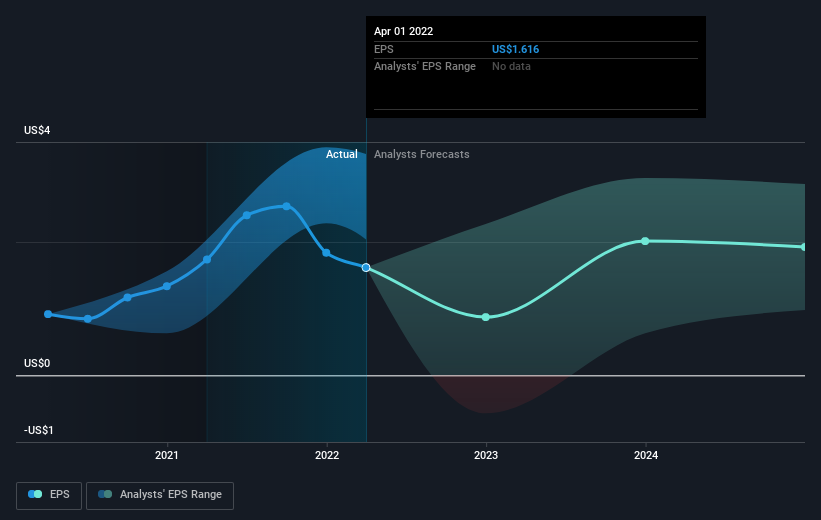The one-year shareholder returns and company earnings persist lower as Enovis (NYSE:ENOV) stock falls a further 5.1% in past week
Passive investing in an index fund is a good way to ensure your own returns roughly match the overall market. When you buy individual stocks, you can make higher profits, but you also face the risk of under-performance. Investors in Enovis Corporation (NYSE:ENOV) have tasted that bitter downside in the last year, as the share price dropped 60%. That contrasts poorly with the market decline of 18%. Even if you look out three years, the returns are still disappointing, with the share price down30% in that time. Shareholders have had an even rougher run lately, with the share price down 21% in the last 90 days. However, one could argue that the price has been influenced by the general market, which is down 17% in the same timeframe.
Since Enovis has shed US$162m from its value in the past 7 days, let's see if the longer term decline has been driven by the business' economics.
View our latest analysis for Enovis
While the efficient markets hypothesis continues to be taught by some, it has been proven that markets are over-reactive dynamic systems, and investors are not always rational. By comparing earnings per share (EPS) and share price changes over time, we can get a feel for how investor attitudes to a company have morphed over time.
Unfortunately Enovis reported an EPS drop of 6.7% for the last year. The share price decline of 60% is actually more than the EPS drop. This suggests the EPS fall has made some shareholders are more nervous about the business.
The image below shows how EPS has tracked over time (if you click on the image you can see greater detail).
We consider it positive that insiders have made significant purchases in the last year. Having said that, most people consider earnings and revenue growth trends to be a more meaningful guide to the business. This free interactive report on Enovis' earnings, revenue and cash flow is a great place to start, if you want to investigate the stock further.
What about the Total Shareholder Return (TSR)?
We've already covered Enovis' share price action, but we should also mention its total shareholder return (TSR). The TSR is a return calculation that accounts for the value of cash dividends (assuming that any dividend received was reinvested) and the calculated value of any discounted capital raisings and spin-offs. Enovis hasn't been paying dividends, but its TSR of -31% exceeds its share price return of -60%, implying it has either spun-off a business, or raised capital at a discount; thereby providing additional value to shareholders.
A Different Perspective
We regret to report that Enovis shareholders are down 31% for the year. Unfortunately, that's worse than the broader market decline of 18%. Having said that, it's inevitable that some stocks will be oversold in a falling market. The key is to keep your eyes on the fundamental developments. Regrettably, last year's performance caps off a bad run, with the shareholders facing a total loss of 3% per year over five years. Generally speaking long term share price weakness can be a bad sign, though contrarian investors might want to research the stock in hope of a turnaround. It's always interesting to track share price performance over the longer term. But to understand Enovis better, we need to consider many other factors. For example, we've discovered 3 warning signs for Enovis that you should be aware of before investing here.
If you like to buy stocks alongside management, then you might just love this free list of companies. (Hint: insiders have been buying them).
Please note, the market returns quoted in this article reflect the market weighted average returns of stocks that currently trade on US exchanges.
Have feedback on this article? Concerned about the content? Get in touch with us directly. Alternatively, email editorial-team (at) simplywallst.com.
This article by Simply Wall St is general in nature. We provide commentary based on historical data and analyst forecasts only using an unbiased methodology and our articles are not intended to be financial advice. It does not constitute a recommendation to buy or sell any stock, and does not take account of your objectives, or your financial situation. We aim to bring you long-term focused analysis driven by fundamental data. Note that our analysis may not factor in the latest price-sensitive company announcements or qualitative material. Simply Wall St has no position in any stocks mentioned.

 Yahoo Movies
Yahoo Movies 

